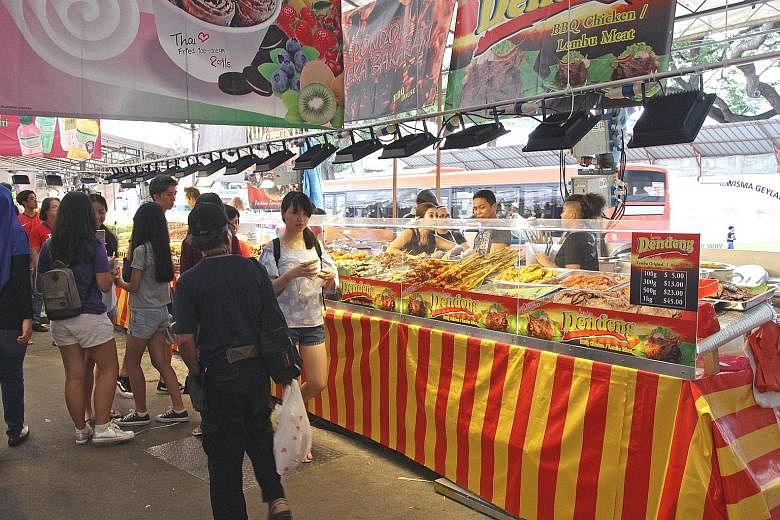The recent case of 22 unlicensed workers nabbed at the Geylang Serai Bazaar is hardly an isolated one.
Over the last two years, the Ministry of Manpower (MOM) has conducted 76 enforcement operations against illegal employment at Singapore's night markets. They arrested 257 illegal workers during this period, a spokesman said.
MOM gave the statistics in response to queries from The Straits Times, following recent reports on the hiring of illegal workers at these markets.
On Thursday, MOM charged a 40-year-old Singaporean man with hiring 19 foreigners without valid work passes to work at night markets in Singapore last year. On Tuesday, 22 illegal workers were arrested at the Geylang Serai Bazaar in a joint operation by the MOM, National Environment Agency (NEA) and Singapore Police Force.
These incidents brought to light a common practice in night markets islandwide: the hiring of illegal workers.
Anecdotally, it seems that these workers are from neighbouring countries and they enter Singapore on social visit passes.
Some stall owners claim there are at least 100 illegal workers at the Geylang Serai Bazaar, while others estimate that 40 per cent of the 1,000 stalls has hired illegal workers.
Stall owners at the ongoing Punggol Ramadan Night Bazaar attribute the high number of illegal workers to high rental costs.
Mr Faizal Yunos, 37, who sells chendol at the bazaar, said: "Rent is getting too expensive, so stall owners hire illegal workers. Cheaper labour will save costs."
It costs about $6,000 to rent a stall at the Punggol bazaar for the month of Ramadan, while the rental cost at the Geylang Serai Bazaar is between $16,000 and $20,000.
"Illegal workers are usually paid $40 to $80 a day. Locals are paid $80 to $100," said Turkish ice-cream seller Ahmet Akpinra, 37, who has been working at night markets for 16 years.
He added that illegal workers are usually willing to work almost 12 to 15 hours a day.
Mr Alan Toh, 61, president of the Trade Fair Merchants' Association, said: "We tell stall owners not to get illegal workers but they can't find local people to work."
When asked if illegal workers are a problem at the stalls he oversees, Mr Toh said there was "no such thing happening".
However, it was at a tent he oversees that the 22 workers were arrested on Tuesday.
"The contractors know what's happening but they choose to close one eye," said a stall owner at the Geylang Serai Bazaar who asked not to be named.
One of the issues with illegal workers at these markets is that they may not prepare food according to standards set by NEA.
"There is no accountability," said bazaar customer Philson Tan, 42, a consistency management executive.
Food handlers in Singapore have to pass a basic hygiene course andmust be registered with the NEA. Last year, NEA took about 200 enforcement actions against trade fair stall licensees for engaging unregistered food handlers at temporary fairs, said an NEA spokesman.
Mr Tan said: "I think law enforcement certainly knows about the severity of the issue but... they can't be there 24 hours a day.
"Workers will try to play hide- and-seek once they are tipped off. Then they just disappear when the police come."
Under the Employment of Foreign Manpower Act, a foreign worker without a valid work permit can be fined up to $20,000 or jailed for up to two years, or both.

